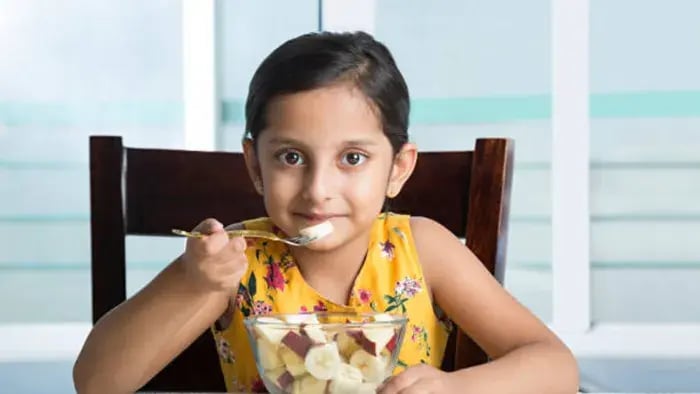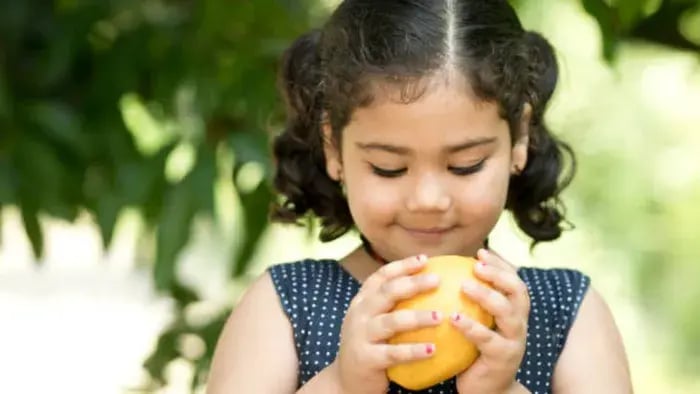- Right After Waking Up
- Before School
- During Mid-Morning Break
- As Part of Lunch or Right After
- Before an Evening Play Session or Activity
- After School but Before Homework
- As an Early Evening Snack
Introduction

Fruits are nature’s energy boosters, they are full of natural sugars, vitamins, fibre and also help with hydration. But timing is everything when it comes to how these nutrients support a child or teen’s day. As per a study published in Int J Environ Res Public Health. 2019, eating fruits at the right times can help concentration, prevent energy crashes and support healthy digestion. Whether it’s a banana before school, an apple during break or a papaya after playtime, when kids eat fruits can be just as important as what fruits they eat.
For school-going children and teenagers, a packed schedule of classes, sports, and assignments means their bodies and brains need steady energy. A fruit eaten at the wrong time might not give the same benefits; it could leave them hungry too soon or sluggish if paired with a heavy meal. That’s why understanding the best times to eat fruits becomes a simple but smart strategy in daily nutrition.
When timed well, fruits become more than just a snack, and they support learning, play, and mood throughout the day. This helps kids and teens feel full of energy and stay focused without reaching for unhealthy options. Let’s get into how to make fruit timing work for growing minds and bodies.
Best Times for School Kids and Teens to Eat Fruits for Energy

Fruits are loaded with nutrients that fuel your body and mind. For kids and teens with school schedules, sports, and after-school activities, knowing when to eat fruits can make a big difference in energy levels and focus. The right timing helps the body absorb nutrients efficiently, keeps hunger in check, and boosts brain power naturally. Here are seven of the best times to eat fruits for steady energy and good health:
Right After Waking Up
According to Indian Academy of Pediatrics (IAP), morning is one of the best times for kids to eat fruit. After a long night of fasting, the body is ready to absorb nutrients. Eating fruits like bananas, apples, or oranges on an empty stomach can provide natural energy and support digestion. While most fruits are gentle and beneficial, acidic fruits like citrus may cause acidity in some people with sensitive stomachs.
Before School
As per a study published in Front Hum Neurosci In 2013, a small fruit snack before school, especially with breakfast, gives a balanced energy boost. It helps you stay focused through the first half of school hours and keeps your mind sharp. Think of it as brain food before the day’s lessons begin.
During Mid-Morning Break
According to the Dietary Guidelines for Indians, mid-morning is when energy levels dip, which is why fruits like guava or pear during this time can restore energy and hydration. It also prevents kids from feeling too hungry before lunch and helps them stay more engaged in class.
As Part of Lunch or Right After
Fruits with lunch make meals more nutritious and colorful. Research done by Nutrients. 2018, suggested that eating fruits right after lunch, especially those high in fibre like papaya or watermelon, can support digestion. Just make sure fruits aren’t consumed immediately after heavy or oily meals, as it might cause discomfort.
Before an Evening Play Session or Activity
Kids and teens get hungry before sports or playtime, which is why, according to FSSAI, a fruit like a banana, apple, or grapes 20-30 minutes before physical activity gives quick energy without weighing them down. It also keeps them hydrated and ready to move.
After School but Before Homework
According to FSSAI, this is a critical transition time from school to home, from a full day of learning to having a relaxed time at home. Instead of reaching for chips or sweets, a fruit snack can give energy and help focus for homework. Try mango slices, chikoo or a fruit chaat to make it enjoyable and satisfying.
As an Early Evening Snack
Research done by Int J Environ Res Public Health. 2019, suggests that fruits around 5-6 pm can calm the appetite without spoiling dinner. It’s beneficial for kids who feel hungry but don’t need heavy snacks. Seasonal fruits or a fruit bowl can healthily satisfy your cravings.
Conclusion

Eating at the right time makes a big difference to your child’s energy, focus, and digestion. Whether it’s morning kickstart, midday boost, or evening hunger, fruits are a natural and nutritious option. By introducing fruits at key times like breakfast, school breaks or after activities, you are teaching your child mindful eating habits. These small choices add up to long-term wellness. Most importantly, fruits are a yummy and easy way to support growing minds and bodies. Get your kids to eat a variety of fruits throughout the day and build a routine.
Her love for storytelling began with reading her grandfather’s speeches, where Tarishi saw the power of words in creating lasting memories. Combining her passions for food and writing, she has turned her life into a fulfilling path of sharing stories that celebrate flavours and how food brings communities together.
The views expressed are that of the expert alone.
The information provided in this content is for informational purposes only and should not be considered a substitute for professional medical advice, diagnosis, or treatment. Always seek the advice of your physician or another qualified healthcare provider before making any significant changes to your diet, exercise, or medication routines.
References
https://pmc.ncbi.nlm.nih.gov/articles/PMC6888291/
https://www.fssai.gov.in/upload/uploadfiles/files/Compendium_Nutra_29_09_2021.pdf
https://pmc.ncbi.nlm.nih.gov/articles/PMC6315720/
https://www.nin.res.in/dietaryguidelines/pdfjs/locale/DGI24thJune2024fin.pdf
https://pmc.ncbi.nlm.nih.gov/articles/PMC3737458/
https://iapindia.org/pdf/Ch-044-Nutrition-5-12-y-IAP-Parental-Guidelines-28112021.pdf
















